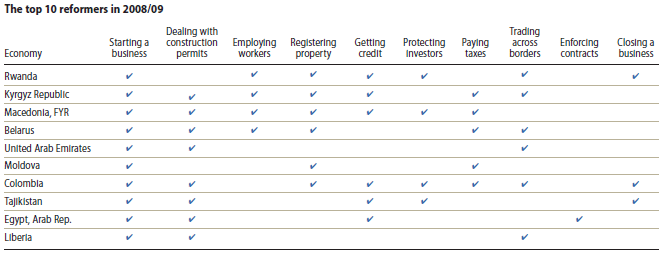This year reformers were particularly active in Eastern Europe and Central Asia and the Middle East and North Africa. In Doing Business 2010, there were four new reformers among the top 10: Liberia, the United Arab Emirates, Tajikistan and Moldova. Others include Colombia, Egypt, Belarus, the Former Yugoslav Republic of Macedonia, and the Kyrgyz Republic. Colombia and Egypt have been top global reformers in four of the past seven years.
For the first time since Doing Business started tracking reforms, a Sub-Saharan African economy, Rwanda, led the world in reforms. Rwanda has steadily reformed its commercial laws and institutions since 2001. In the past year it introduced a new company law that simplified business start-up and strengthened minority shareholder protections. Entrepreneurs can now start a business in two procedures and three days. Rwanda has also enacted new laws in order to improve regulations to ease access to credit. Other reforms removed bottlenecks at the property registry and the revenue authority, reducing the time required to register property by 255 days. Overall, Rwanda introduced reforms in 7 out of the 10 categories, rising from 143rd to 67th place on the ease of doing business rankings.Every one of the top ten reformers introduced measures to improve the ease of starting a business, and 8 out of the 10 made it easier to deal with construction permits. In Macedonia starting a business now takes four days, because the central registry forwards relevant company information to other institutions. Several documents no longer have to be notarized. Moldova offers an expedited, 24-hour company registration service for an additional fee. Egypt and the United Arab Emirates have eliminated minimum capital requirements.Such reforms are timely. Many firms in developing economies have suffered from lower demand for their exports and a drop in private capital flows. At the same time businesses in low-income economies on average still face more than twice the regulatory burden that their counterparts in high-income economies do when starting a business, transferring property, filing taxes or resolving a commercial dispute through the courts. Developed economies have on average 10 times as many newly registered firms per adult as Africa and the Middle East - and a business density four times that in developing economies.
